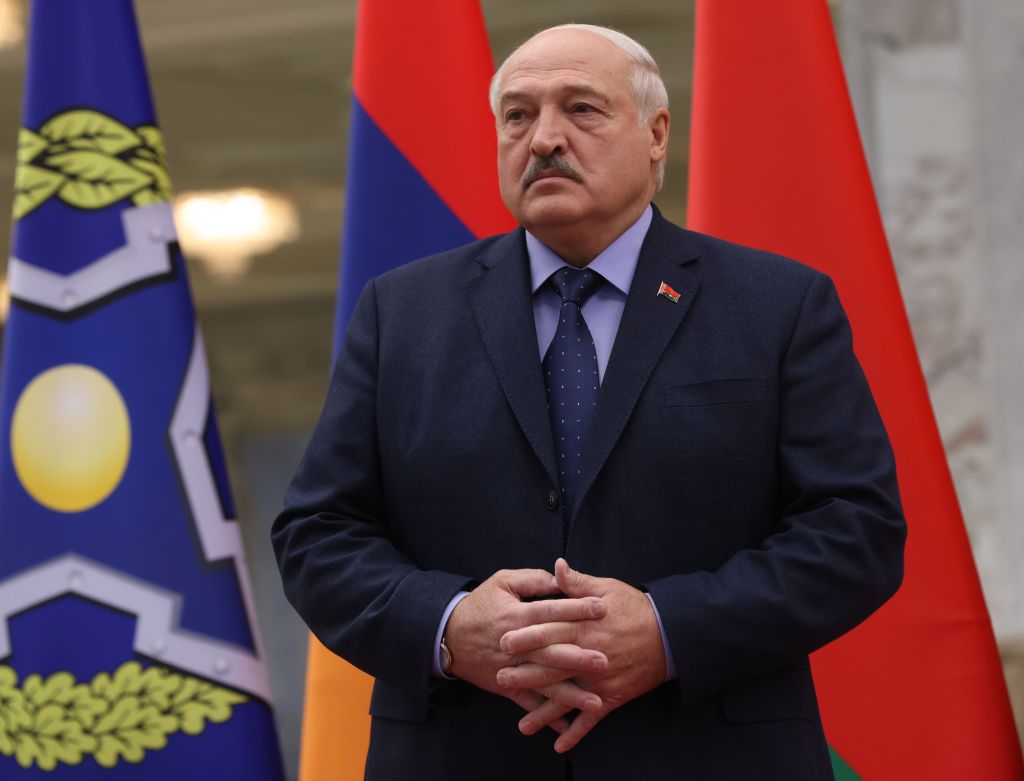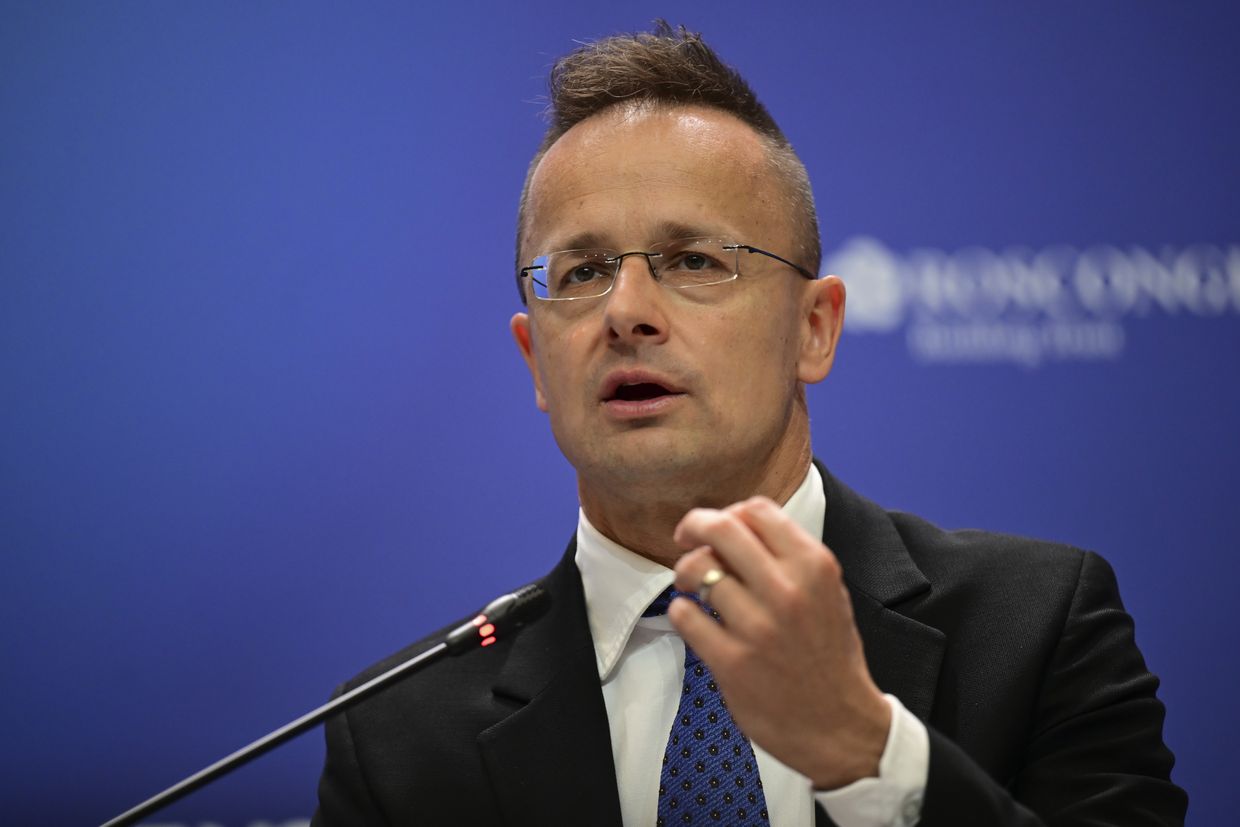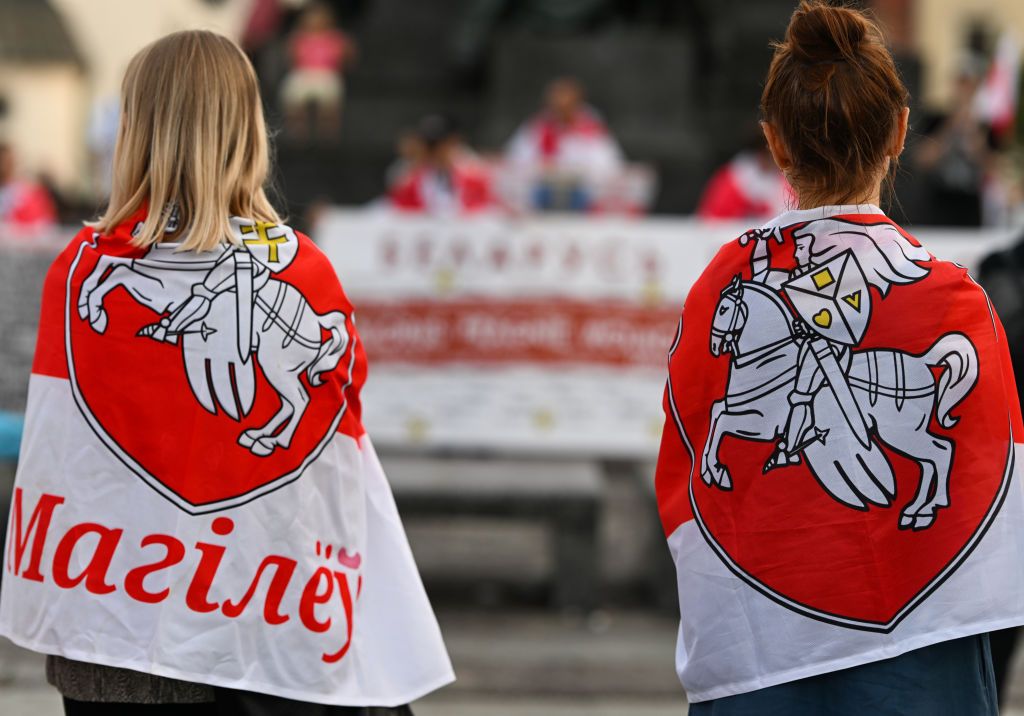
Belarus concludes registration for the 2025 presidential election, allowing six token candidates to “challenge” dictator Alexander Lukashenko at the ballot.
Ahead of the upcoming election, Belarusian law enforcers conduct sweeping raids, human rights group Viasna reports.
Hungarian Foreign Minister Peter Szijjarto argues against sanctions, engages with Belarus, Russia at Eurasian Security Conference in Minsk.
Serbia releases Belarusian activist Andrei Hniot after a yearlong detention over Belarus’s extradition request.
Seventh political prisoner dies in custody in Belarus, human rights group Viasna says.
Belarus Election Committee clears six pro-Lukashenko candidates to ‘challenge’ him in 2025 presidential election
The Belarusian Central Election Committee (CEC) has finished registering people that would be allowed to take part in the upcoming presidential elections scheduled for Jan. 26, 2025.
The regime-controlled committee allowed six friendly candidates to start collecting signatures to run against the country’s dictator Alexander Lukashenko.
Lukashenko is seeking a seventh consecutive term in office after over four years of brutal crackdowns on civil society that eliminated 1,700 non-profit organizations, outlawed all but four loyal parties, and jailed Lukashenko’s main political opponents along with around 1,300 people, now considered to be political prisoners.
The CEC registered the nomination groups of Anna Kanapatskaya, a spoiler candidate taking part in the 2020 presidential campaign, Siarhei Bobrykau, Belarusian Union of Officers chairman, and Siarhei Syrankou, the leader of the Communist Party of Belarus.
The previously registered initiatives are those of Lukashenko and three other loyalists: Aleh Haidukevich, leader of the pro-Lukashenko Liberal Democratic Party; Alexander Hizhnyak, leader of the Republican Party; and a former spokeswoman of the Interior Ministry, Olga Chemodanova.
Lukashenko said he considers the nomination of his supporters to be dictated by the desire to “secure” him.
“I’m sure they just want to flank me here, to keep me safe, no more, no less. Well, I would like it that way,” Lukashenko told a state-owned TV channel.
RFE/RL political analyst Valer Karbalevich wrote that “the nomination of several candidates, apart from Lukashenko, is designed to create the illusion that the current campaign is no different from the previous ones.”
Belarus has had no free or fair elections since Lukashenko came to power in 1994. During mass protests in 2020, the Belarusian regime relied heavily on Russia’s support to quell domestic unrest.
Meanwhile, independent election observers said they would attempt to monitor the conduct of the “election” from afar. The Belarusian Helsinki Committee and Human Rights Center Viasna established the “Human Rights Activists for Free Elections” campaign to monitor elections via publicly available sources when independent observation is impossible on site.
“Conducting a free and open election campaign is impossible in a situation of political terror,” the campaign said in its first election report.
“It seems that the only role of the remaining registered candidates is to formally demonstrate the presence of an alternative in the 2025 elections, but not to overshadow the main candidate or even create the illusion of competition,” says the campaign’s lawyer, Sviatlana Halauniova.
The registered initiative groups have until Dec. 6 to gather over 100,000 signatures for their candidates to enter the race.
The process of gathering signatures will occur at a time when repression still haunts those who signed for alternative candidates in 2020, Polish-backed news outlet Belsat reports. Employees at government agencies, banks, military enterprises, and plants were fired for supporting Lukashenko’s opponents.
“It is such a sometimes invisible process that it is impossible to evaluate,” Viasna’s Pavel Sapelka told Belsat. “We know about the phenomenon, but we cannot estimate its scale,” he said.
Exiled opposition leader Sviatlana Tsikhanouskaya, who claimed to have beaten Lukashenko in the 2020 presidential election, denounced the elections as an “imitation” and “non-elections.” Her office called on supporters to protest against the rigged elections by voting against all.
Other voices in the exiled opposition have called for a full boycott or consolidated voting for one of the spoiler candidates. Still, in the absence of a fair vote count, the effectiveness of either strategy would be hard to prove, political analyst Artsiom Shraibman suggests.
Belarusian authorities launch countywide raids ahead of presidential elections, Viasna says
Belarusian law enforcers launched massive countrywide raids starting Oct. 31, Human Rights Group Viasna reported, saying the arrests and searches were part of a “pre-election intimidation campaign.”
Viasna reports that the Belarusian KGB security agency detained dozens of individuals in the capital, Minsk, in the oblast centers of Homiel and Mahiliou, as well as regional cities across the country under the pretext of investigating an alleged “conspiracy to seize power.”
“Human rights defenders know that detentions are taking place all over Belarus. They look like a planned act of intimidation before the elections,” Viasna said on its official Telegram channel.
At least 80 individuals have been targeted in the raids so far, according to the evacuation department of BYSOL, an initiative in exile that helps repressed Belarusians.
“According to our data, the isolation center on Okrestina (Street, in Minsk) is overcrowded. There are 16 people in cells for 3-4 people,” a BYSOL representative told the independent outlet Zerkalo.
Some of those first detained remain in custody, while others were released after being declared witnesses in cases. The criminal code stipulates a minimum of eight years of imprisonment for those convicted of conspiring to seize power.
Law enforcers frequently target those who were previously detained on politically motivated administrative charges. According to Viasna, this number exceeds 36,000 cases.
Cases of brutal detentions, with unjustified use of force, have also been reported.
Hungarian FM speaks out against sanctions against Minsk at a security conference in Belarus
Hungarian Foreign Minister Peter Szijjarto criticized European Union sanctions against Belarus and Russia and advocated for cooperation instead of “burning bridges” at a security conference in Belarus on Oct. 31, Belarus state-owned news agency Belta reports.
The Minsk International Conference on Eurasian Security, envisaged as a competitor to the Munich Security Conference organized by the Russia-led bloc, the Collective Security Treaty Organization (CSTO), was expecting to host 600 high-ranking representatives from 45 countries but saw a much more humble attendance. Apart from Hungary’s Szijjarto, Russian Foreign Minister Sergey Lavrov and Syrian Foreign Minister Bassam al-Sabbagh attended the conference.
“Let’s all hope together that we will not be judged for this discussion,” Szijjarto said on starting his keynote speech, which he delivered in Russian. The Hungarian foreign minister said Hungary had the right to negotiate directly with anyone, and said Budapest opposes the sanctions against Russia and Belarus.
“We do not accept any restrictions on whom we cooperate with. We dislike sanctions politics,” Szijjarto said.
During the conference, Szijjarto held talks with Russia’s Lavrov and Belarus’s Foreign Minister Maksim Ryzhankou.
“We Hungarians conclude that if sanctions don’t work, we shouldn’t engage in them, we shouldn’t impose them,” Szijjarto said after talks with Ryzhankou on Oct. 31 in Minsk.
Szijjarto claimed that increasing cooperation with Belarus was in Hungary’s “national interest.”
Hungary, which currently holds the rotating EU presidency, is the only country in the European Union that maintained ties with the Lukashenko regime following its crackdown on dissent and subsequent engagement in Russia’s war against Ukraine. Szijjarto visited Minsk twice in 2023 and in May 2024, sparking criticism from the exiled Belarusian opposition.
Hungary has remained the most Kremlin-friendly country within the EU, and has repeatedly opposed Ukraine’s accession to NATO and the EU, obstructed sanctions on Russia, and undermined Western aid efforts for Ukraine.

Serbia releases Belarusian activist after year-long detention
Belarusian political activist and film director Andrei Hniot, who was held in Serbia for a year under threat of extradition to Belarus, has been released, his lawyer reported on Oct. 31.
Hniot was detained in October 2023 in Serbia based on tax evasion charges issued by the Belarusian police. Hniot’s defense insists the charges were politically motivated and issued retroactively, without legal grounds for the case. They also accused Minsk of exploiting Interpol’s “Red Notice” arrest warrant system to harass exiled dissidents with politically motivated charges.
The Higher Court in Belgrade waived Hniot’s detention on Oct. 31, as the legal deadline for the extradition case had expired, Filip Sofijanic, Hnyot’s lawyer in Belgrade, told RFE/RL.
New restrictions were not imposed, allowing the activist to leave Serbia for Germany.
Despite Hniot’s safe exit to an EU-member state, the extradition case is not closed, Maria Kolesava-Hudzilina, a member of his legal team and former president of the Belarusian Association of Human Rights Lawyers, says.
“This (extradition) procedure may continue for a long time, as it has no statute of limitations — it can be a year or 10 years,” Kolesava-Hudzilina said, highlighting that the Belarusian activist still risks extradition in other countries.
Interpol temporarily blocked access to the director’s data in its database on Feb. 27, but the Belarusian state is continuing its case against him. On the day of Hniot’s release, Belarus authorities placed his Instagram page on its list of “extremist materials.”
Exiled Belarusian opposition and human rights groups campaigned for Hniot’s release this year. In a press conference on Nov. 2, Hniot thanked Belarusian opposition leaders Sviatlana Tsikhanouskaya and Pavel Latushka, as well as German officials, including Chancellor Olaf Scholz and Deputy German Ambassador to Serbia Carsten Meyer-Wiefhausen.
Hniot’s ordeal in Serbia involved several rounds of deportation approval and reversed decisions between December 2023 and August 2024. The Appeal Court in Belgrade, expected to be the highest in the judicial process, found that the Higher Court’s extradition ruling was made “based on an incomplete establishment of the facts, which led to a significant violation of criminal procedure rules” and ordered a retrial.
Hniot spent five months in a Serbian jail and seven more – under house arrest.
In 2020, Hniot participated, along with thousands of others, in widespread protests against the results of the Belarusian presidential elections that were roundly condemned internationally as neither free nor fair. He founded the Belarus’s Free Association of Athletes, which was later branded as an extremist organization by the Belarusian government.
Viasna: Seventh political prisoner dies in custody in Belarus

A 22-year-old political prisoner serving a 12-year prison sentence for “espionage” and “aiding extremist activities,” has died in custody, Human Rights Center Viasna reported on Nov. 1.
Russian-born political prisoner Dmitry Shletgauer is the seventh of the jailed opponents of Belarusian dictator Alexander Lukashenko’s to die in prison following the crackdown on Belarusian civil society that started after mass protests in 2020. Following fraudulent presidential elections and nationwide demonstrations, over 6,000 Belarusians underwent criminal persecution, and some 1,300 individuals are currently held behind bars on politically motivated charges.
Shletgauer’s 12-year sentence for alleged espionage and facilitation of extremist activities was handed down after a closed trial this year. The evidence in the case remains unknown to human rights defenders.
Shletgauer was found dead on Oct. 11, a month after his transfer to Mahiliou penal colony No. 15, where he was supposed to serve his term, Viasna reports. The authorities have not disclosed the cause of his death. Shletgauer’s family confirmed his death to the independent news outlet Zerkalo, without providing further details.
Political prisoners in Belarus are held in harsh conditions: They are deprived of medical care, and subjected to arbitrary punishments and debilitating forced labor in penal colonies. Activist Vitold Ashurak, prominent artist Ales Pushkin, blogger Mikalai Klimovic, and activists Ihar Lednik, Vadzim Khrasko, and Aliaksandr Kulinich are known to have died while in custody.
Belarusian oppositions have compiled a “humanitarian” list of around 200 political prisoners who have severe medical conditions and who might not survive their time in prison.
However, Belarusian authorities have paid little attention to the opposition’s humanitarian list when releasing political prisoners – most of the 115 individuals released in four recent rounds of pardons were not on it.

